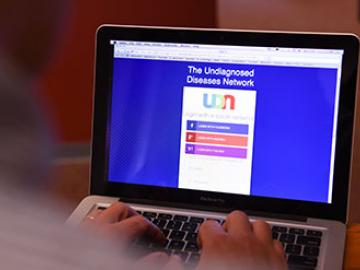
The Undiagnosed Diseases Network (UDN) is now accepting patient applications through its online portal, the UDN Gateway. Through funding from the National Institutes of Health Common Fund, the UDN was formed to diagnose patients who suffer from mysterious medical conditions that have eluded even skilled physicians. Solving these challenging cases requires new tools and a new paradigm for clinical care.
“Diagnosis at the edges of our knowledge calls upon clinicians to be data-driven, cross-disciplinary and collaborative in unprecedented ways,” said Jeffrey S. Flier, dean of Harvard Medical School. “This new clinical paradigm requires new infrastructure that spans geography, institutional boundaries and the divide between clinical care and research.”
The UDN Gateway was developed by the UDN Coordinating Center based in the Department of Biomedical Informatics at HMS in collaboration with investigators at Boston Children’s Hospital. In addition to processing applications, the Gateway serves as the knowledge store for everything that is learned about patients with undiagnosed diseases and their conditions through week-long UDN clinical evaluations and genetic testing. The information aggregated in the Gateway will be available to all of the researchers and clinicians in the network, so that patients are given every opportunity for a diagnosis.
“Often, people with undiagnosed diseases go from place to place seeking answers; information and expertise are fragmented. The UDN Gateway brings this valuable information and expertise together. The combination is powerful medicine for those living with mysterious conditions,” said Rachel Ramoni, executive director of the UDN Coordinating Center and one of its principal investigators.
The UDN is made up of seven clinical sites, two DNA sequencing facilities and the coordinating center. The clinical sites are located at the NIH Clinical Center, Bethesda, Maryland; Baylor College of Medicine; Duke Medical Center with Columbia University; HMS teaching hospitals (Brigham and Women’s Hospital, Boston Children’s Hospital; and Massachusetts General Hospital); Stanford Medical Center; University of California at Los Angeles Medical Center; and Vanderbilt University Medical Center.
The DNA sequencing facilities are located at the Baylor College of Medicine and at the HudsonAlpha Institute for Biotechnology in Huntsville, Alabama, partnering with Illumina of San Diego.
By the summer of 2017, the network is expected to be accepting about 450 patients per year.
For more information about the UDN and to apply for funding through the UDN Gateway, go to http://undiagnosed.hms.harvard.edu/.